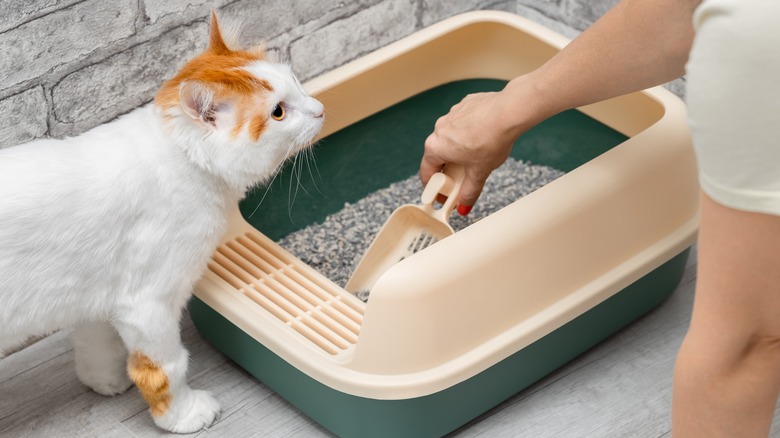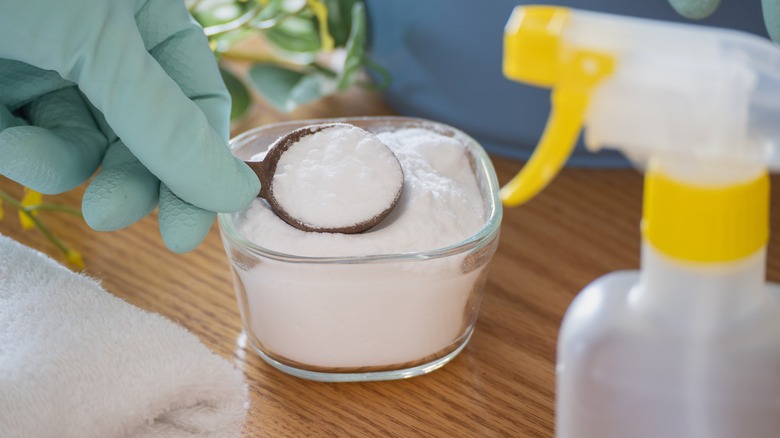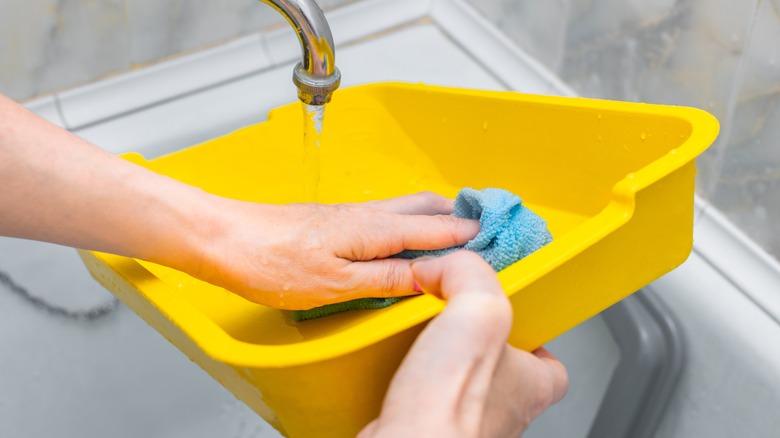Why Baking Soda In The Litter Box Isn't As Genius As You Might Think
We may receive a commission on purchases made from links.
Baking soda is often touted as a miracle product. It's a kitchen cleaner! It's a mouthwash! And for many pet parents, it's one of the most popular and cost-effective cat litter deodorizers. Pouring just a little bit of baking soda into your fresh litter after you've scooped out the smelly spots can help it stay fresh and odorless. But is it really a good idea to sprinkle baking soda in your kitty's litter box?
There are certainly some advantages to using baking soda to combat your cat's smelly litter box. It's typically fragrance-free, which means it won't deter your cat the way some scented litter deodorizers do. It's also widely available in most grocery stores, making it easily accessible. Finally, it does not contain any toxins that are immediately harmful to felines.
However, you might want to think twice before you go pouring baking soda over your cat's litter box. The first consideration is the dust that the fine powder can produce. Litter can get extremely messy, especially if you have an overly enthusiastic digger, and baking soda will only exacerbate that problem. But that's not the only potential downside for you and your cat.
Health risks of using baking soda in your cat's litter box
Although contact with baking soda won't generally cause harm to cats, the dust that it creates from being kicked up in the litter box could bother your cat if they accidentally inhale it. Moreover, while baking soda is generally considered safe for cats to ingest in small quantities, it can be toxic if eaten in larger amounts. Between 2 and 4 teaspoons per kg of your cat's weight could upset your cat's stomach, make them vomit, or cause lethargy or even seizures, per The Spruce Pets. That being said, as long as you only sprinkle small amounts of baking soda in your litter box, your cat should be just fine. It's not likely they'll ingest what's mixed into their litter.
Another interesting issue with baking soda has to do with the ammonia produced by cat urine (yes, really). Cat urine releases ammonia, and if it's not cleaned up in a timely manner, the rate at which ammonia is produced could potentially increase with the presence of baking soda in the litter box. This is because baking soda raises the pH level of the environment. Elevated ammonia levels in the air could cause you and your family to experience allergic reactions like irritated eyes and even lead to respiratory issues for you and your cat.
What to use in your litter box instead of baking soda
If you've decided that a sprinkle of grocery store baking soda in the litter box is not your jam but still want to take care of the odor situation, there are deodorizers specifically formulated for cat litter boxes like the Arm & Hammer Stay Fresh Filters made with charcoal and zeolite. Of course, the best thing you can do to minimize odors in your cat's litter box is to stay on top of cleaning it.
Scoop the box at least once or twice daily and give it a full wash at least once a week. To properly wash your litter box, empty the contents and soak it in hot, soapy water for several minutes before rinsing. Let dry before refilling with litter. If you have more than one cat, you may need to clean the box and change the kitty litter even more frequently. Litter boxes take work to maintain, but putting some effort into having a clean, odorless place for your cat to relieve themselves is miles better than dealing with the stink.


